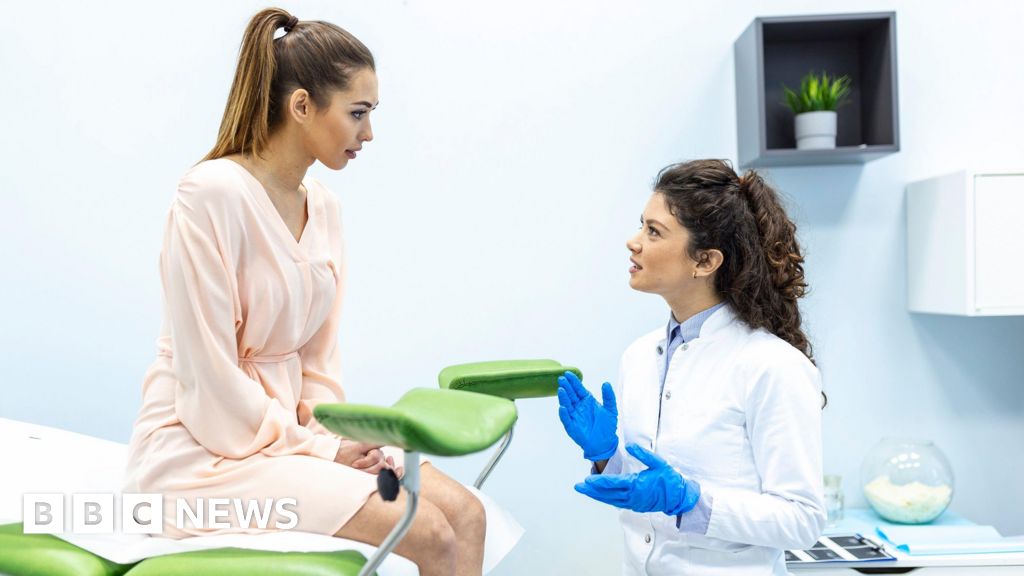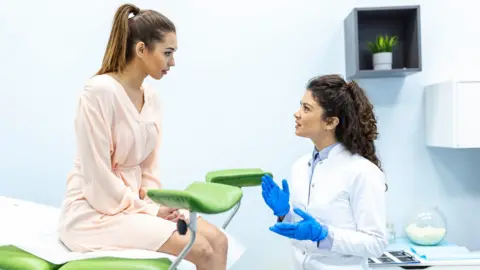Cervical screening knowledge gap ‘costing lives’, says charity

 Getty Images
Getty ImagesA knowledge gap around cervical screenings is currently “costing lives”, a cancer charity says.
The Eve Appeal says more women need to know they can ask for adjustments to their cervical screenings, which can be painful, uncomfortable or distressing for some.
The test is thought to save about 5,000 lives every year in the UK, but many women do not get tested.
Research commissioned by the charity suggests most women do not know they can make the test easier by asking for longer appointments, smaller speculums, or move to more comfortable positions.
‘You can take control’
The screening, which tests for the presence of human papillomavirus (HPV) – the virus that causes cervical cancer – is offered by the NHS to all women and people with a cervix aged between 25 and 64.
The test involves taking a sample of cells from the cervix. If any abnormal cells are found, they can be removed or monitored to prevent cancer developing.
However, according to latest NHS England data, more than five million eligible women are not up to date with their routine screening, with the lowest uptake being among women aged between 25 and 29 (58%).
Eve Appeal chief executive Athena Lamnisos said this was “worrying” and that any barriers people experience around the screenings could be “easily overcome”.
“There are really simple, straightforward things that you can ask for that patients just aren’t aware of….basically, you can take control.”
The survey of more than 1,100 women was carried out by YouGov ahead of Cervical Cancer Prevention Week.
The charity said women should know they can ask for screening adjustments like:
- Moving to more comfortable positions for the test
- Asking for it to stop at any time if they are in discomfort
- Booking double appointments so they have plenty of time for the procedure and do not feel rushed
- Asking for lubrication to be used
- Inserting or guiding the speculum themselves
- Bringing along a friend for support
Ms Lamnisos said disabled people, those with some health conditions and anyone who does not speak English were among those who felt there were barriers to testing.
“Overcoming those challenges and having those information gaps filled, is going to save lives,” she added.
 Eve Hewitt
Eve HewittEve Hewitt, who has Crohn’s disease and vaginal scarring from surgery, told the BBC she asks for her screenings to be adjusted, because of potential pain and bleeding.
“If I don’t go in prepared and ready to advocate for myself there is a lot of anxiety about the pain that could happen,” she said.
Ms Hewitt, from Cambridgeshire, said she always asked for a smaller speculum to be used and for a double appointment to “break the ice” with the nurse.
“If I can say ‘these are the things that concern me, I’m concerned about pain, how uncomfortable it’s going to be for me and perhaps how difficult it might be for the nurse too’ – if we can discuss that beforehand, we can go in with a bit of an action plan, and that really helps me.
“Sometimes I find a pillow under my bum helpful and makes it more comfortable for me and a bit easier for the nurse too. If I feel like it’s not working I will rebook the appointment.”
Ms Hewitt said she agreed there seemed to be a “complete lack of knowledge” and understood why some people did not go for screenings.
“If I didn’t know I could ask for adaptations, there is a quite a high chance I would have been put off.”
NHS England aims to eliminate cervical cancer by 2040, with the use of cervical screening and the HPV vaccine, which is cutting cases of cervical cancer by 90% in England, figures show.
NHS England says those who have been vaccinated still need to attend cervical screenings, as there is still a small chance they could develop cancer.
World News || Latest News || U.S. News
Source link




